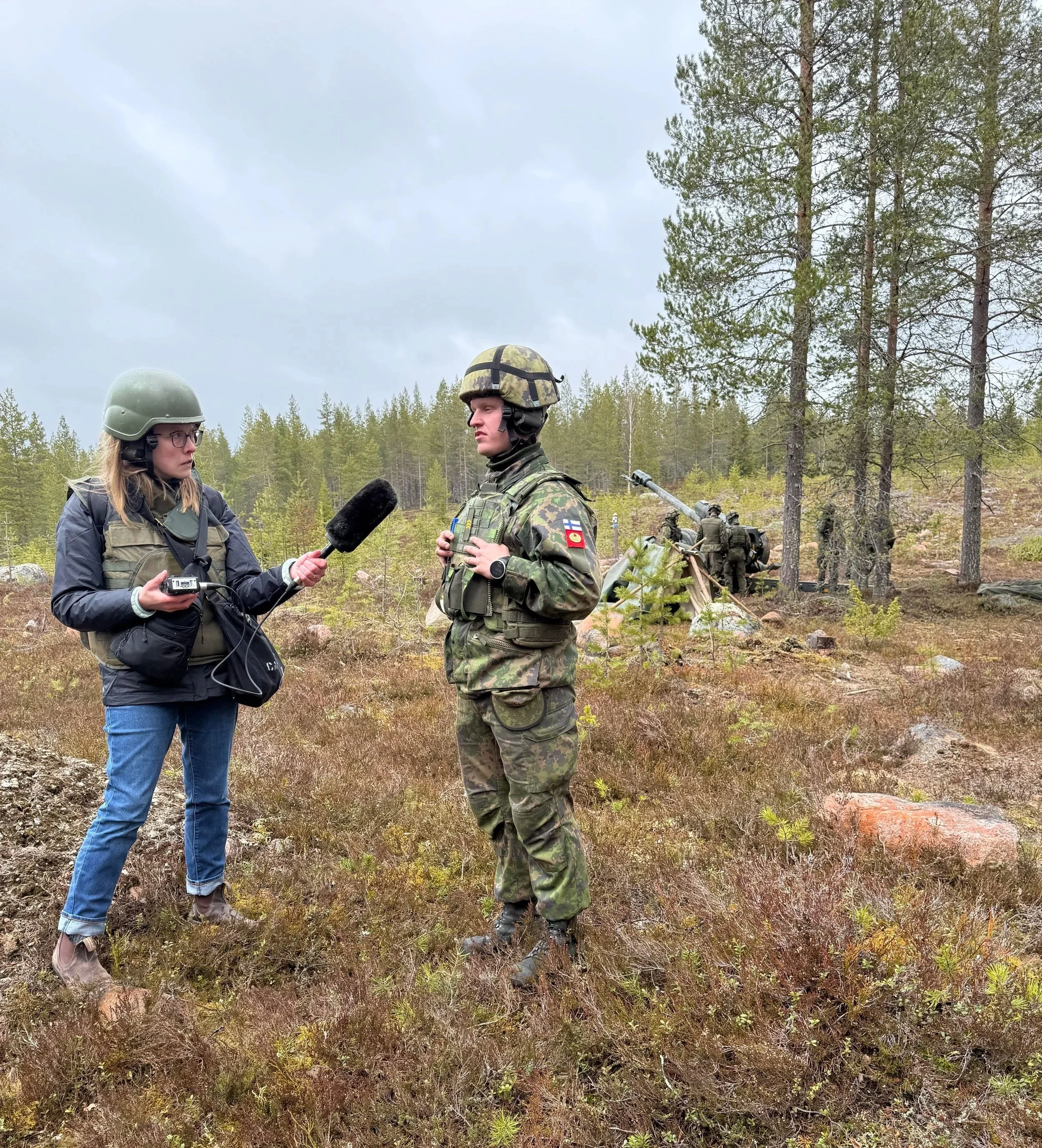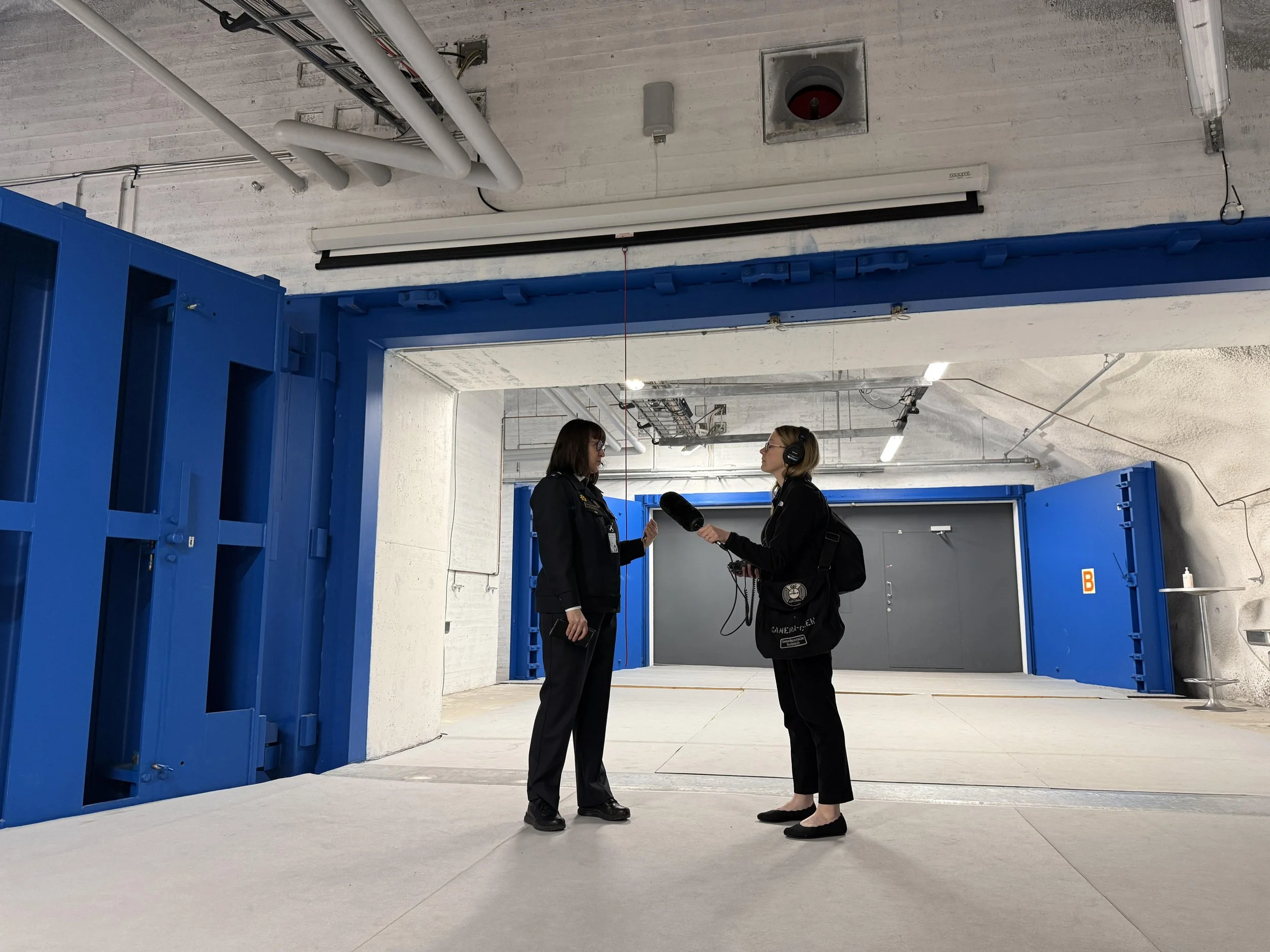Emma Godmere, a journalist with CBC Radio’s The House, has been awarded this year’s $25,000 R. James Travers Foreign Corresponding Fellowship. It will enable her exploration of defence and security issues in three Arctic states and what Canada can learn from them.
The CBC will support her multi-platform project on its website, social media accounts, and CBC Television when it is ready to be rolled out in the autumn of 2025.
See the news release from Carleton University, which administers the endowed Fellowship fund.
The Story
There is consensus among political and defence leaders: Canada must strengthen its Arctic security – now.
Russia is building up its military capacity north of the Arctic Circle. China is eyeing polar shipping routes and natural resources including oil and gas. The two authoritarian nations are even increasing their cooperation in the area.
Yet in the face of these increasing tensions, Canada risks complacency in the absence of more comprehensive action. The Department of National Defence has painted a worrisome picture of Canada’s combat readiness and the country suffers from a “fragmented approach to defence in the Arctic.” Disinformation, AI, and social media present additional challenges to national security as the threat of foreign interference continues to loom large.
Following numerous background conversations with Canadian Arctic security experts, current and former diplomats, and academics based in Nordic states, it’s clear that a robust response to national security concerns must include military preparedness – and civil preparedness.
As Godmere notes, this is where Canada can turn to key Arctic allies for inspiration and collaboration.
The Journalist
Emma Godmere has produced award-winning radio and podcasts at CBC for more than a decade, spending the last five years focused on federal politics and public policy with the parliamentary bureau in Ottawa. For CBC’s long-running flagship political affairs program The House, she has reported from across the country and produced in-depth coverage on critical minerals, climate policy, and the Canada-U.S. relationship. Her audio diary following a Ukrainian woman in Kyiv in the early days of the Russian invasion won a radio documentary Gracie Award in 2023.
The Journalism
Emma Godmere reported, produced, edited and mixed a full-length feature audio documentary on what Canada can learn from Finland and Sweden about preparedness for CBC Radio's The House, landing on national airwaves and multiple podcast feeds — reaching listeners of CBC's Front Burner, Ideas, and World Report, as well as The House — across Labour Day weekend 2025. The in-depth coverage was accompanied by an online article and videos on CBC News' TikTok and YouTube channels. Read, listen and watch her work below, along with additional coverage from Greenland featured on The House and on CBCNews.ca.
Aug 30, 2025:
Audio documentary:
The threat next door: How NATO’s newest members are preparing to defend against Russia
Article:
Canada is strengthening defence ties with Finland and Sweden. What can they teach us?
Sept 2 + 3, 2025
YouTube:
Why all of Finland is preparing for the next Russian attack
TikTok:
Preparing for threats from Russia is a way of life in Finland
Inside a Finnish bomb shelter
Sept 27, 2025
Audio feature:
Checking in on Canada's other next-door neighbour
Article:
Amid threats of annexation, could Canada and Greenland grow closer?
The Reporter's Notebook
Less than thirty seconds after I emerged from the car at Rovajärvi, I was handed a flak jacket and helmet.
Before I could hoist on the gear, the Finnish Army reps emphasized the need for ear protection as well. They fished out a sturdy military-grade headset and a small packet of neon-orange foam earplugs from their stash and plunked them into my gloved hands.
Interviewing Samu, a sergeant with the Finnish Army, at the Rovajärvi artillery range north of the Arctic Circle.
Here’s the issue: gathering quality audio requires constant monitoring of volume levels and every rustle of sound your microphone picks up. Your headphones simply can’t come off while your red recording light is on.
While I was well prepared with layers of clothing for the cold May morning just a few clicks north of the Arctic Circle, it would be impossible to manage layers of ear coverings. Safety first. I had to set my levels, press record, and hope for the best.
That might have been one of the biggest takeaways from reporting in the field solo, abroad, for over a month: prepare the best you can, and then at a certain point, you’ve just got to let go — and soak it all in.
Swedish soldiers in full camouflage witness joint training exercises involving Finnish and Swedish forces at Rovajärvi, in Finnish Lapland.
Five weeks earlier, it was hard to picture myself standing a few feet behind a line of artillery cannons, fired (loudly, indeed) by 20-year-old conscripts running exercises in Finland’s vast northern military training range. At that time, I was deep into federal election coverage, which in many ways felt like a world away. Yet hearing about security and sovereignty so frequently throughout the campaign, from politicians and voters alike, hit home the importance of diving deep into a defence-focused topic like this — especially at this moment.
The Travers Fellowship is an incredible opportunity to remind Canadians of what’s going on in our wider world and how inherently connected we are to it all. The breadth and space it offers to journalists, to explore a story that requires so much more than a phone call or a Zoom link, is unparalleled. Being in a place, hearing from people who live and breathe these experiences every day — there’s no substitute for it.
Finnish conscripts gather around a 122-mm howitzer during training exercises at Rovajärvi, the largest artillery practice range in Western Europe.
Preparing for this kind of reporting trip, on your own and especially amidst a busy news cycle running nonstop around you, can be a significant lift: booking travel, chasing interviews, figuring out a litany of on-the-ground logistics while still thousands of kilometres away takes time and careful planning. It’s also true that there’s only so much you can map out and secure in advance. I know many previous Fellows have shared similar reflections: it’s not only worthwhile, but simply necessary to give yourself time and space while there on the ground to make connections, stay curious, and see where a tip might take you. One of the most incredible lines that stuck with me, that I was able to work into my feature audio documentary, came about not through a pre-planned and pre-chased interview, but rather a spontaneous conversation I happened to strike up with a seatmate on an hour-and-a-half flight spanning the length of Finland. Being nimble enough to pull out my recording gear in the airport after we’d landed, instead of rushing off to the rental car counter, allowed for the discovery of an unexpected nugget. Who knew I’d be seated next to someone who could so eloquently speak about being so wary of a next-door neighbour for generations that it feels “written in our bones”?
Touring an underground bomb shelter some 20 metres below Finland's capital city with Nina Järvenkylä of the Helsinki City Rescue Department. (Credit: Emma Presley)
I’m endlessly grateful to the Travers Fellowship, for not only their support of my own reporting project, but for the fact that they’ve built something that can support so many more journalists to come. If you’ve ever considered applying, don’t hesitate to toss your hat in that ring. You never know where your reporting may take you.
Gathering sound by the floating ice in the serene Nuuk Fjord outside Greenland's capital.






